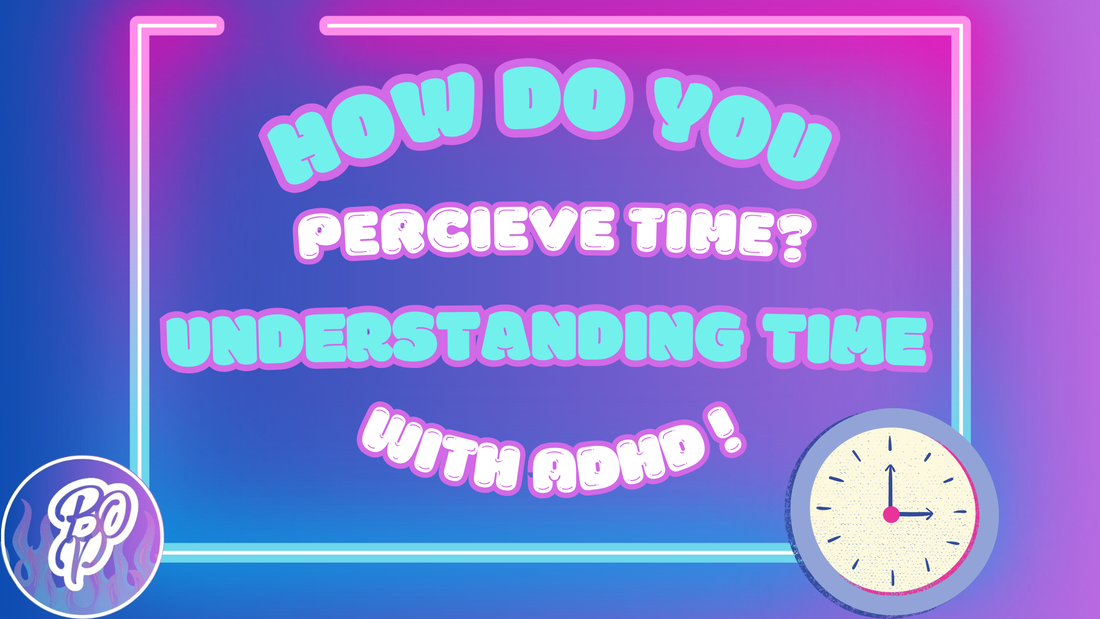
How Do You Perceive Time? Understanding Time with ADHD ⏰✨
Share
Do you often feel like time is slipping through your fingers, or that it’s difficult to manage your schedule? If you’re someone with ADHD, you might have a unique perception of time—one that doesn’t always follow the traditional structure of hours and days. 🌪️ Understanding how ADHD impacts time perception can help you develop strategies to work with your brain, not against it. Let's explore some common questions that can shed light on how ADHD affects time management.
1. What is the First Day of the Week for You? 📅
-
Sunday or Monday?
Many people perceive Sunday as the start of the week, while others see Monday as the first day. For those with ADHD, the beginning of the week might feel blurry, and sticking to weekly routines can be challenging. -
Impact on Your Routine:
Whether you start the week on Sunday or Monday, understanding how this affects your schedule can help you create more structure and avoid feeling overwhelmed at the start of each week.
2. Do You Assign Colors or Numbers to Days? 🌈🔢
-
A Unique Way of Organizing Time:
Some people assign colors, numbers, or even shapes to different days of the week. For ADHDers, this could be a subconscious way of organizing days when traditional time management methods feel ineffective. -
Neurodivergent Perspective:
Interestingly, some individuals with ADHD experience synesthesia, a condition where senses overlap, causing them to perceive days, dates, or even numbers as colors or patterns. This can help make sense of the week in a way that’s easier to navigate.
3. How Do You Visualize the Year? 🧠🗓️
-
Straight Line, Circle, or Spiral?
When you think of the year, how do you picture it? For some, it’s a straight line from January to December, while for others, it’s more like a circle or spiral. 🌀 -
How ADHD Alters Time Visualization:
With ADHD, the concept of a year can feel fragmented. Months might slip by unnoticed, or the passage of time may not feel as linear. Recognizing this can help you stay mindful of upcoming deadlines and events.
4. Do You Experience Time as "Now" and "Not Now"? ⏳
-
What is Time Blindness?
Time blindness is a common experience for those with ADHD. It means that your perception of time is more focused on the present moment, with the future feeling distant or unimportant. -
How It Affects Planning:
When time is divided into “now” and “not now,” future planning becomes a struggle. Deadlines can sneak up on you, and tasks seem to take forever to get started until they suddenly become urgent.
5. Do You Struggle with Estimating How Long Tasks Will Take? ⏰
-
Underestimating Tasks:
ADHD can make it difficult to accurately estimate how long a task will take. You may think something will only take 10 minutes, but in reality, it stretches into an hour. -
Why This Happens:
Time blindness leads to difficulties in tracking the passage of time. When you’re engaged in a task, it’s easy to lose track of time, which can lead to frustration or missed deadlines.
6. How Do You Track Time? 📱
-
Using Alarms, Timers, or Gut Feelings?
ADHD brains often rely on different tools for tracking time. Some prefer using alarms ⏰, timers ⏲️, or their "gut feeling" to gauge time. -
Traditional Tools Don’t Always Work:
Planners and clocks may feel less effective for ADHDers. Instead, you might find that a more intuitive system works better for staying on track.
ADHD and Time Blindness: A Deeper Dive ⚡
Time blindness is a hallmark of ADHD. 🧠 Here’s how it shows up:
-
The Present vs. The Future:
ADHD brains struggle to see the connection between the present moment and future outcomes. As a result, tasks are often left until the last minute because they seem distant and less urgent. -
Hyperfocus:
When you're deeply engaged in a task, time can feel like it stands still, which leads to hyper-focusing on the present and neglecting future responsibilities.
Pro Tips for Managing Time with ADHD 🧠
-
Visual Time Management Tools:
Use color-coded calendars 🌈 or visual schedules 📅 to make time feel more concrete and manageable. -
Set Multiple Alarms & Timers:
Break tasks into smaller, time-bound chunks and set multiple alarms or reminders ⏰. This keeps you accountable and on track. -
Develop a "Gut Feeling" for Time:
Over time, you can train yourself to develop a better sense of how long tasks actually take. Practice estimating how much time you think a task will take, then check the actual time it took to see how accurate you were. 🔄
Why Understanding Time Perception Matters 🧠💡
Understanding how your brain processes time can help you develop strategies to work with, rather than against, your mind. Whether you’re managing ADHD or just curious about different ways of perceiving time, recognizing the unique ways your brain works can give you the tools to thrive. 🎯
By embracing your own time perception and experimenting with different strategies, you can better manage tasks, avoid overwhelm, and feel more in control of your schedule.
🎧 Listen Now & Join the Conversation!
Click here to listen to the full episode or read more about managing ADHD time challenges!
💬 What surprised you about this topic? Do you relate to time blindness or struggle with estimating how long tasks take? Share your thoughts below!
📌 Tag a friend who could benefit from learning more about time blindness and ADHD! 👫
